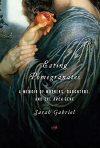
No matter what a person does in life, for good and bad, his or her inherited genetic makeup follows along the way. Such was the case with British journalist Sarah Gabriel, who inherited the BRCA1 mutation from her mother, who died of ovarian cancer when Ms. Gabriel was in college. Much of her mother’s suffering was a family secret until she was on her deathbed, hours away from dying. Although Ms. Gabriel did her best to lead her own young life, carefree and tumultuous at once, she was stalked by a single shadowy question: Am I fated to develop and die of the same cancer that killed my mother? That question, along with other ghosts, is the thrust of a new memoir by Sarah Gabriel called Eating Pomegranates: A Memoir of Mothers, Daughters, and the BRCA Gene.
Finding the Lump Over a Glass of Wine
Early on, the reader learns that Ms. Gabriel had a difficult time with her stern, stiff-upper-lip mother, who allowed herself to have five babies right in a row, depleting her for proper motherhood, a theme that plays out throughout this powerful memoir. In chapter one, the author is on a couch drinking wine, watching TV, a soccer game her husband is enthralled by, and performing her first ever breast self-exam.
As I examine my left breast … my finger rolls over a lump. It feels like finding the shilling in the Christmas pudding.— Sarah Gabriel
Tweet this quote
“As I examine my left breast…my finger rolls over a lump. I put down my glass and finger the lump with fascination. It is about a centimeter in diameter and neatly spherical, with a shallow raised edge. It feels like finding the shilling in the Christmas pudding,” writes Ms. Gabriel. She is an accomplished writer who knows how to drop in a metaphor for maximum punch.
The next day, the author, obviously nervous, goes to the Cancer Genetics Clinic at The Royal Marsden Hospital in London. She has inherited the Mi8T mutation on the BRCA1 gene. She had a mammogram 8 months prior, which “had pronounced [her] clear of cancer.” Despite the head of cancer genetics description of the findings as being of “uncertain clinical significance,” Ms. Gabriel is left breathless. Her mother died of ovarian cancer at age 42; Ms. Gabriel is 44, with a loving husband and two daughters, and she leaves the clinic “breathless,” feeling as if she’d been living on borrowed time.
Bad News
Over the following days, it was discovered that the author had not one but six tumors in her left breast: three of them diagnosed as malignant. Throughout her treatment, a bilateral mastectomy, chemotherapy and radiation therapy, Ms. Gabriel keeps the reader engaged in how every aspect of her therapies affects her body, and she does an excellent job. She does stray into a historical backdrop, a rather lengthy history of William Marsden, the English surgeon who founded several hospitals, the most famous being the eponymous Royal Marsden.
BOOKMARK
Title: Eating Pomegranates: A Memoir of Mothers, Daughters, and the BRCA Gene
Author: Sarah Gabriel
Publisher: Scribner
Publication Date: February 2013
Price: $17.99, paperback, 272 pages
The author makes clear her disdain for the privileged upper class, and Dr. Marsden, being a champion of the poor, was undoubtedly a hero of hers. She also delves into the surgical theater prior to anesthesia, describing a breast cancer resection. She writes: “As for the woman herself, the scream that she started to emit from the first incision had no more human existence in it than that of a fox being torn apart by hounds or a soldier being disemboweled by a bayonet.” Both histories are interesting but seem a bit like filler in her otherwise unflinchingly personal memoir.
Mothers and Daughters
The most bracing content is when the author writes about her concerns for her two daughters. She tells her 5-year old daughter, Michaela, that they will get things back to normal when everything calms down. “Michaela might be only 5, but she knows an ‘unposable’ question when she has one. She looks at me in silence and the question of when that will be hangs in the air between. She doesn’t dare ask it.”
The book’s title is derived from Greek mythology—Demeter and her daughter, Persephone—and the author uses it, at times, as a device to push her story forward. She writes wonderfully about the indignities of her treatments and the fact that those around her just don’t get what she’s going through. Her anger at times is white hot, and sometimes it comes off as misdirected.
Another qualm is when she is not writing about how cancer has traumatized her and her family, the prose becomes bogged down in a British and tedious literary voice. Those misgivings aside, -Eating Pomegranates is one of the best cancer memoirs of the year and is recommended for readers of The ASCO Post. ■

